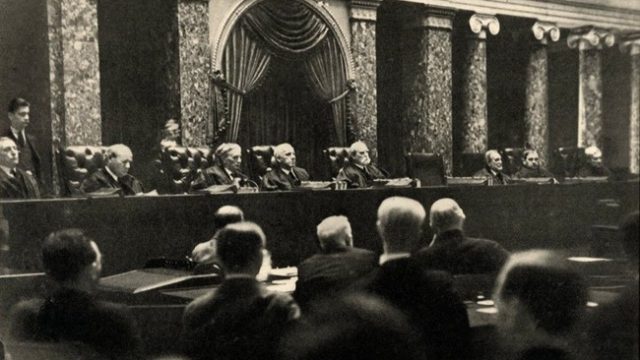Should The Supreme Court Need A Supermajority To Strike Down A Law?

Amid the furor over the Supreme Court’s decision to strike down state laws banning gay marriage, the Grand Forks Herald chimes in with an editorial calling for the implementation of an old progressive idea.
Why not require a supermajority of justices to strike down a law?
[mks_pullquote align=”right” width=”300″ size=”24″ bg_color=”#000000″ txt_color=”#ffffff”]The courts are supposed to be a check on legislative and executive powers, but very often the courts serve as enablers.[/mks_pullquote]
“That was a sound suggestion when the progressives made it in the early 1920s,” writes opinion editor Tom Dennis for the Herald. “They were reacting to 5-4 decisions that overturned key child-labor, workers’ compensation and minimum-wage reforms. It remains a sound suggestion today, when conservatives are the ones fretting about a 5-4 decision that overturned gay-marriage restrictions in dozens of states. And even liberals should remain concerned about the way the current system vests near-absolute power over the Constitution in one swing vote on the Supreme Court.”
As a conservative, the general problem I see with the Supreme Court isn’t that they’re striking down too many laws (though I can understand why progressives see that as a problem). It’s that they’re not striking down nearly enough laws. Social conservatives may be upset with SCOTUS over the gay marriage ruling, but a better illustration of this problem is the King vs. Burwell decision upholding insurance subsidies in Obamacare.
Rather than SCOTUS fulfilling the role of the judiciary, which is to strike down laws that aren’t legal (in this case subsidies issued outside what a clear reading of the law allows), the justices in the majority on that opinion instead found a way to rationalize the legality of what the government was doing.
That seems to very often be the case with everything from the Supreme Court upholding forced sterilization eugenics laws (Buck vs. Bell) to expropriation (Kelo vs. City of New London) to racial segregation (Plessy vs. Ferguson).
The courts are supposed to be a check on legislative and executive powers, but very often the courts serve as enablers.
Requiring a supermajority to declare a law unconstitutional would only make it even less likely that laws would be struck down.
I’m not sure that’s the direction we need to go in.




